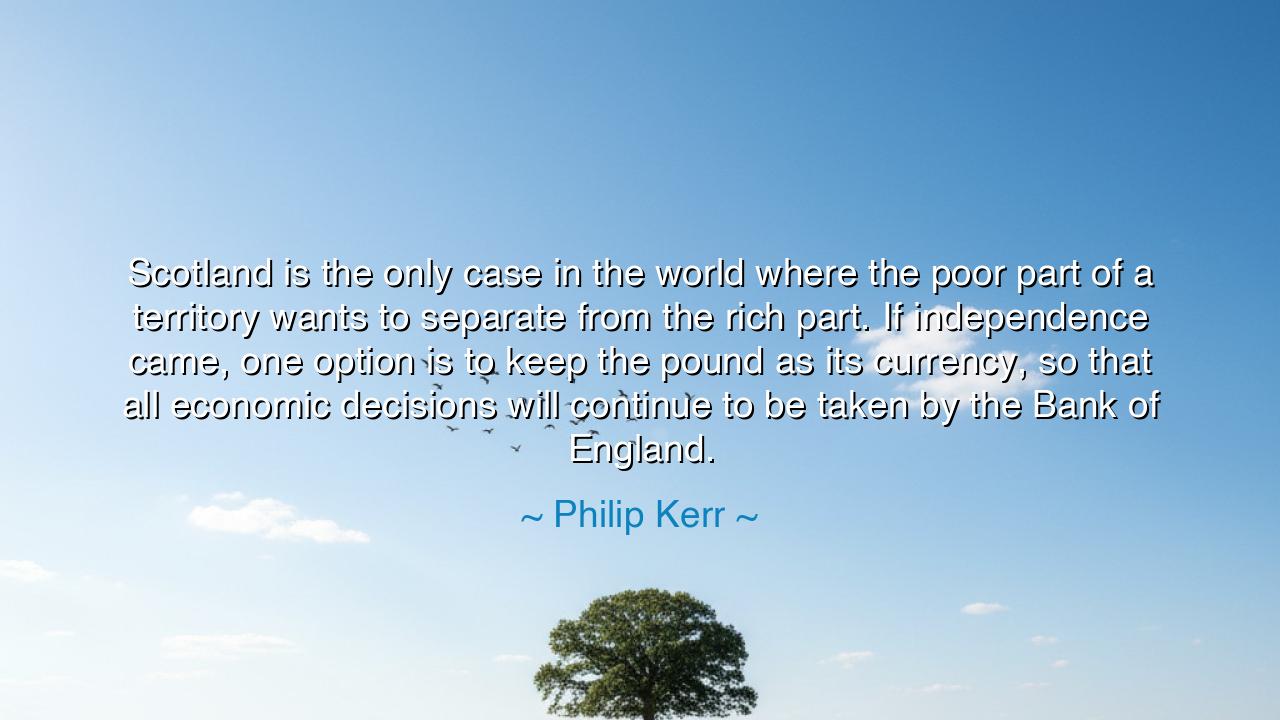
Scotland is the only case in the world where the poor part of a
Scotland is the only case in the world where the poor part of a territory wants to separate from the rich part. If independence came, one option is to keep the pound as its currency, so that all economic decisions will continue to be taken by the Bank of England.






The Paradox of Freedom and Dependence
Hear now the words of Philip Kerr, who gazed upon the highlands and lowlands of a divided land and spoke with the insight of one who sees beyond the mist of politics:
“Scotland is the only case in the world where the poor part of a territory wants to separate from the rich part. If independence came, one option is to keep the pound as its currency, so that all economic decisions will continue to be taken by the Bank of England.”
At first, these words appear as a commentary on nations and money. Yet beneath them lies a timeless lesson about the nature of freedom, dependence, and the price of identity. For what is independence, if one’s heart is free but one’s hands remain bound? And what is wealth, if it demands the surrender of one’s soul?
The Struggle Between Pride and Prudence
In Kerr’s observation lies a paradox that has haunted humankind for centuries: the tension between national pride and economic survival. Scotland, the land of rugged beauty and fierce spirit, has long carried the dream of self-rule—a yearning as old as the mountains themselves. Yet, as Kerr reminds us, that dream exists alongside a cruel reality: that independence, in this case, might come with dependence of another kind—dependence upon the very currency and policies of the land from which separation was sought.
Thus, his words are not mockery but mirror—showing how the heart of a people may long for sovereignty, while their welfare remains tethered to forces beyond their reach. It is the eternal struggle between the ideal and the practical, between the banner of freedom and the chains of necessity.
The Ghosts of History
This paradox has been seen before. Think of the Greek city-states, once fierce and free, who fell to dependence upon the silver of Persia and later the gold of Rome. Athens, proud and wise, once declared that no foreign king would dictate her destiny. Yet when famine came and trade failed, her envoys bent their knees before foreign powers. Her mind remained free, but her markets were not.
So too, Kerr’s words remind us that true independence is not declared—it is earned and sustained. A nation may raise a flag and proclaim liberty, but if its bread, its coin, or its hope depends upon another’s hand, then its sovereignty is but a dream wrapped in silk.
The Wealth of the Spirit
Yet we must not dismiss Scotland’s desire, nor any people’s call for self-determination. For sometimes poverty of body hides wealth of soul. The will to govern oneself, even amid hardship, is the spark that has kindled revolutions and restored nations. Scotland’s yearning for independence—though it may seem economically unwise to some—is also a cry of remembrance, a declaration that a people’s worth cannot be measured only in silver and gold.
History has shown that empires built on wealth alone crumble, while small nations bound by identity endure for centuries. The heart of a nation, like the heart of a person, beats not for comfort but for dignity.
The Wisdom of Balance
Still, Kerr’s warning stands as a pillar of wisdom: independence without self-reliance is illusion. A people must first master the art of sustaining themselves—through knowledge, innovation, and unity—before breaking the bonds of a greater power. To cast off one master only to kneel before another is not freedom, but folly.
Thus, his mention of the pound and the Bank of England is not merely economic—it is symbolic. It reminds us that power often hides in the smallest symbols: a coin, a treaty, a decision made in a distant hall. The truest freedom requires vigilance not only of borders but of minds.
The Modern Parable
Imagine a youth who wishes to leave his father’s house, proud and full of dreams. Yet he depends on his father’s coin to live, his father’s name to be known, his father’s wisdom to guide him. If he departs too soon, he will find the world cold and unyielding. But if he remains forever, he will never grow into his own strength. The wise course is not rebellion or submission, but preparation—to build strength quietly, until one can stand on one’s own feet with honor.
So it is with nations. So it is with all who seek freedom—personal, political, or spiritual. Freedom requires not only courage, but competence.
The Lesson of Kerr’s Words
Therefore, let those who hear this teaching remember: freedom without foundation is fleeting, and dependence without dignity is despair. Before one severs the ties that bind, one must first forge the tools that sustain. Build your economy before you raise your flag. Strengthen your spirit before you challenge your master.
And if you must still lean upon another’s strength, do so with open eyes—not as a slave, but as a student learning the art of self-sufficiency. For the day will come when you will no longer need to borrow your neighbor’s coin or counsel. Then, your independence will not only be proclaimed—it will be real.
For freedom that cannot feed itself is fragile, but freedom that has learned both humility and strength endures forever.






AAdministratorAdministrator
Welcome, honored guests. Please leave a comment, we will respond soon